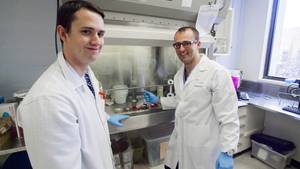An illness or injury can interrupt life’s normal activities. The unwanted intrusion of a health crisis can cut into time spent with family and friends and time spent earning a living.
For many patients, this loss of income can be difficult to manage, particularly in an economic environment marked by both a housing crisis and rising inflation. The situation is compounded when a patient requires medication or medical devices not covered by an insurance plan.
In September, the QEII Foundation made the QEII Patient Assistance Fund available to help patients afford life’s necessities.
“Together with the QEII donor community and our QEII partners, we created the QEII Patient Assistance Fund to provide financial support to patients when they need it most,” says Susan Mullin, president and CEO of the QEII Foundation. “When someone is sick, money should be the last of their worries.”
Grants of up to $1,000 can be used to pay for rent, mortgage, food, utilities, transportation to medical appointments, medically-necessary dental procedures, and medication not covered by a medical plan.
The QEII Patient Assistance Fund is one of numerous QEII Foundation granting programs. Entirely funded by donors, the grants are available to those receiving both inpatient and outpatient care from the QEII Health Sciences Centre.
As a healthcare social worker at the QEII, Rachel Millet regularly sees what can happen when a personal health crisis is compounded by financial difficulties. In many cases, she says, patients are more concerned about their finances than about their illness.
“It’s something we deal with daily,” says Rachel. “We see a lot of seniors who are on a fixed income, so finances are quite often a factor.”
The grant process is initiated by a healthcare professional – such as a doctor, nurse, social worker or physiotherapist – who applies on a patient’s behalf. As the healthcare professional manages the application and paperwork, it’s a user-friendly process for the patient, who needs only to give permission for the application.
The QEII Foundation does not set any criteria for patient eligibility, other than a need identified by a healthcare practitioner.
“If the client has identified finances as an issue, then the grant can be an option,” Rachel says.
She has applied for grants for three of her patients, and each one has been successfully approved, typically within a few weeks. Rachel has seen the difference a grant can make in a client’s life, as they can pay overdue utility bills and rent. She says it’s always a pleasure to call the client to give them the good news.
Rachel specializes in psychosocial oncology, and is well-versed on the body-mind connection, and how stress can impact a person’s ability to get well.
“Stress can affect the immune system,” she says. “So, if somebody is already immuno-compromised it can lead to more complications, both physical and mental.”Income is a determinant of health, she adds, and so if somebody cannot afford the basics of life it is very hard to focus on recovery.
As of Jan. 27, 100 grant applications have been approved, totalling $44,878. Requests have been approved from a diverse cross-section of the QEII, such as rehabilitation programs, cancer care and dialysis.
“The great thing about this grant is that it’s open to anybody, regardless of illness, so it certainly gives us more options,” Rachel says. “This has really become my go-to grant for patient support.”
To learn more about or donate to the QEII Patient Assistance Fund, visit QE2Foundation.ca/qeii-patient-assistance-fund








